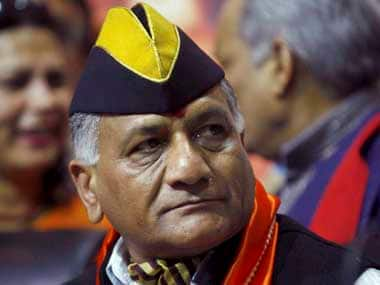Former Army chief General VK Singh’s vehement protest against naming the next Army chief by the UPA government gives an impression of vendetta politics rather than a position on propriety. Barring a few instances, the country’s military tradition has been to appoint the senior-most starred officer as the chief of a particular wing. “The protest was strange, particularly coming from a former Army chief himself. The long-established Indian tradition in appointing service chiefs is about respecting seniority, irrespective of which government is in power. Supersessions are a rare exception. In fact, Gen V.K. Singh himself is a beneficiary of this tradition. He was made Army chief on 1 April 2010, despite grave reservations expressed on record by his predecessor, Gen Deepak Kapoor, whose apprehensions were borne out by V.K. Singh’s tumultuous and very controversial tenure"— author Vishal Thapar wrote in a piece V.K. Singh makes final bid to derail Army succession in The Sunday Guardian. [caption id=“attachment_1490217” align=“alignleft” width=“380”]  Former Army chief Gen (Retd.) VK Singh. PTI[/caption] Singh, who is now contesting the Lok Sabha poll from Ghaziabad as a BJP candidate, did not share a comfortable relationship with the UPA government because of the stand taken by the Centre on his age issue. What makes matters little complicated is the person who in all likelihood will hold charge of the Army baton after incumbent chief Gen Bikram Singh retires on 31 July. As per seniority, Vice Chief of the Army, Lt Gen Dalbir Singh Suhag should ideally be promoted as a four-star General and given charge of the Indian Army. But it does not seem as easy as it appears. Just days before to retire as the Chief of Army Staff Gen VK Singh had imposed a promotion ban (Discipline & Vigilance ban) on the then 3 Corps Commander Lt Gen Suhag for a botched up intelligence operation in Jorhat, Assam. “Dalbir, then commander of 3 Corps, was accused of lapse of command. Despite approval by the Appointments Committee of the Cabinet of his promotion to the rank of Army Commander, which would put him in the line of succession, he was rendered ineligible by this unexpected ban by V.K. Singh. This ban was revoked by General Bikram Singh soon after taking over as chief"— Thapar said in his article. There is fear that if the former Army chief wins his electoral battle he might exert undue pressure to scuttle the line of succession as chiefs. The current Army Chief Gen Bikram Singh also had his share of run-ups with his former boss. Just months before taking over as the COAS, Gen Bikram Singh had to face a lawsuit regarding a fake encounter filed some unknown NGO in the Jammu and Kashmir High Court. As found later this was allegedly funded by some rogue unit in Military Intelligence. Notably enough, if one of the two officers in question fails to make it to the top (Gen Bikram Singh has already made it), “the next-in-line for appointment as chief is the Southern Army Commander, Lt Gen Ashok Singh, who is related to V.K. Singh through marriage. V.K. Singh’s daughter is married to Ashok Singh’s son”. On Sunday, there were reports that the Ministry of Defence has forwarded the name of Lt Gen Suhag to the Prime Minister’s Office as the next Army chief. However, the defence ministry today morning issued a statement calling the report “totally baseless”. The suspense continues as to who will become the next Army chief.
Barring a few instances, the country’s military tradition has been to appoint the senior-most starred officer as the chief of a particular wing.
Advertisement
End of Article


)

)
)
)
)
)
)
)
)



